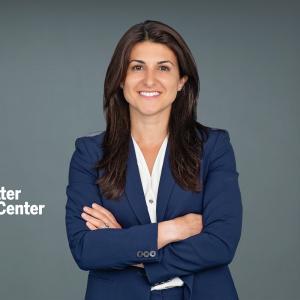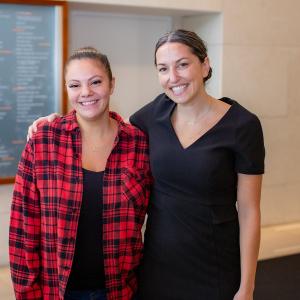
Now in remission after receiving treatment for ovarian cancer, Lauren is back to running, racing, and living a full life, which includes a new daughter.
Photo: NYU Langone Staff
An avid runner, 29-year-old Lauren from Brooklyn had set her sights on participating in the New York City Marathon with her boyfriend. To be eligible, Lauren had to first complete nine qualifying races and volunteer for an additional race.
After she completed her seventh race, she had a routine ultrasound to monitor a cyst she had had on her ovary for the past three years. The radiologist identified what looked like a tumor on her scans, and an online search led Lauren to Leslie R. Boyd, MD, a gynecologic oncologist at NYU Langone Health’s Perlmutter Cancer Center.
Dr. Boyd took Lauren’s age into consideration while crafting her treatment plan, recommending minimally invasive fertility-sparing surgery to remove the tumor but leave her ovary intact. “I loved Dr. Boyd from the beginning. She is brilliant, confident, and reassuring—those were exactly the traits I needed at that time,” Lauren says.
After the tumor was removed and tested, Lauren received a diagnosis of early-stage 1C ovarian cancer, which meant it had not spread beyond the ovary. “Dr. Boyd personally called me to discuss the results of the biopsy. My diagnosis and treatment were well explained, and I felt taken care of,” she adds.
Lauren had a second minimally invasive surgery to remove lymph nodes and the affected ovary, and two months later, she began nine weeks of chemotherapy. She experienced side effects such as mouth sores and the loss of her hair, but after her last round of chemotherapy, Lauren received the news that she had been waiting for—she was officially in remission.
“My relationship with my treatment team helped me manage side effects and complications; with their support, I was able to get through this.”—Lauren, Age 34
Lauren knew that she wanted to complete her qualifying races for the marathon. “I had to finish what I had started. Dr. Boyd gave me the go-ahead but urged me to be careful,” says Lauren, who successfully walked the remaining two qualifying races and went on to run in the New York City Marathon the following year. That same year, Lauren married her boyfriend.
After waiting the two years Dr. Boyd recommended to get pregnant, Lauren and her husband now have a baby girl. “I still get anxious about the possibility of a recurrence, but having my daughter has helped a lot in the healing process,” says Lauren, who continues to have yearly follow-up visits with Dr. Boyd.
For others who receive a similar diagnosis, Lauren’s advice is to select a medical provider that has a plan in place and is able to resolve problems when needed. “My relationship with my treatment team helped me manage side effects and complications; with their support, I was able to get through this,” she says.

